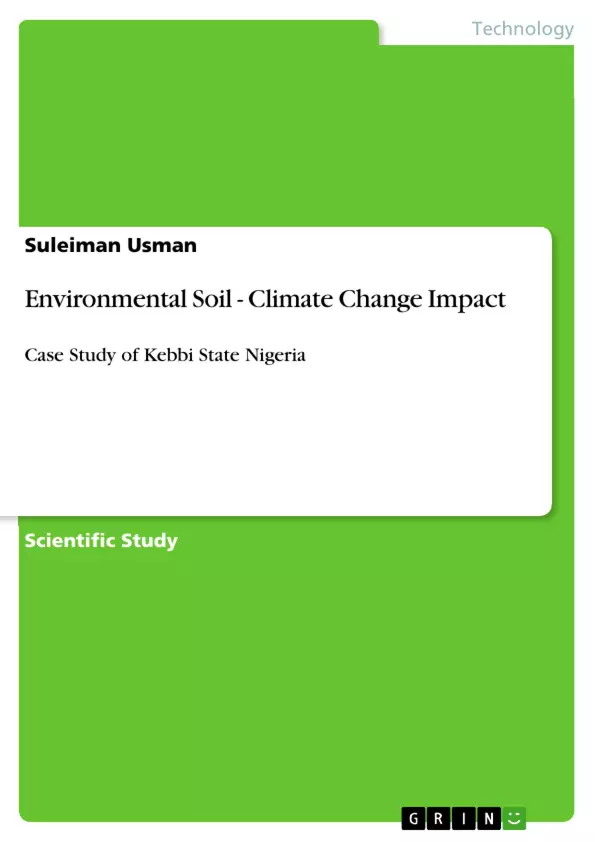The text presented in this book was part of Author’s field study as undergoing PhD programme at Natural Resources Institute, The University of Greenwich UK. Suleiman laboured throughout his field studies to collect as much information from different soil background perspectives to aid him report the soil baseline data information that will be used as reference materials for the Sudan Savannah zone, Kebbi State Nigeria. In the process of this gigantic work, Suleiman obtained some information that is not necessarily accompanied in his PhD thesis, and which the materials in this book is part of that extra materials. The book was aim to address the impact and causes of climate change and soil degradation under agricultural soil environment in Kebbi State Nigeria. The results provided, indicated that farmer’s viewpoints on the impact of climate change and soil degradation have contemplation in the global climate change and soil degradation perspectives. Farmers believed that climate change and soil degradation are interconnected, and have induced some unacceptable changes to their agricultural lands in Kebbi State. The results designated that soil and soil properties were changed in form of soil erosion, desertification, dessert encroachment, leaching, mass movement of soil particles, development of gullies or land channels, and subsequently poor soil quality, poor crop performance and annual yield reduction. Farmers are in the opinion that the major factors underlying the progressive enhancement of these problems are deforestation, poverty, drought, overgrazing, population, poor government policy and poor research development.
Inhaltsverzeichnis (Table of Contents)
- CHAPTER 1
- INTRODUCTION
- An overview background
- CHAPTER 2
- MATERIALS AND METHODS
- Area of study
- Verbal Interview (VI)
- Instrument used for VI
- Procedure used for VI
- Environmental analysis used
- Rainfall data collected
- CHAPTER 3
- RESULTS
- Overall results information
- CHAPTER 4
- DICUSSION
- General discussion
- Rainfall and combined factors
- Rainfall decline or fluctuating
- Rainfall and deforestation
- Drought or long dry season
- Soil erosion and combined factors
- Deforestation and poverty
- Implications and causes
- Quality of the result
- Future agricultural production management of the result
- Future uncertainty of the result
- CHAPTER 5
- CONCLUSION AND RECOMMENDATION
- Conclusion remarks
- Recommendation remarks
- REFERENCES
Zielsetzung und Themenschwerpunkte (Objectives and Key Themes)
This book explores the impact of climate change and soil degradation on agricultural lands in Kebbi State, Nigeria. It utilizes data collected during the author's PhD fieldwork to analyze the interconnectedness of these issues and their implications for local farmers.- The impact of climate change on agricultural practices and soil properties in Kebbi State.
- The role of deforestation and poverty in exacerbating soil degradation.
- The perspectives of local farmers on climate change and soil degradation.
- The importance of understanding local knowledge and experiences in developing effective climate change adaptation strategies.
- The need for sustainable agricultural practices and government policies to mitigate the effects of climate change and soil degradation.
Zusammenfassung der Kapitel (Chapter Summaries)
Chapter 1 provides an overview of the research context, highlighting the growing concern over climate change and its impact on soil degradation in Sub-Saharan Africa. It emphasizes the need for comprehensive research and effective adaptation strategies, particularly in regions with limited economic development and infrastructure.
Chapter 2 details the methods employed in the study, including the area of study, data collection methods, and the specific environmental analysis used. It describes the use of verbal interviews with local farmers and the collection of rainfall data.
Chapter 3 presents the results of the study, highlighting key findings about the impact of climate change and soil degradation on agricultural lands in Kebbi State. It analyzes changes in soil properties, crop performance, and the perspectives of local farmers on these issues.
Chapter 4 discusses the implications of the study's findings, examining the interconnectedness of climate change, soil degradation, deforestation, and poverty. It explores the challenges facing farmers and the potential for future agricultural production management.
Schlüsselwörter (Keywords)
The main keywords and focus topics of the text include: climate change, soil degradation, agricultural practices, deforestation, poverty, Kebbi State, Nigeria, farmer perspectives, sustainable agriculture, adaptation strategies.Frequently Asked Questions
What is the focus of the study in Kebbi State, Nigeria?
The study addresses the impact and causes of climate change and soil degradation within agricultural environments in the Sudan Savannah zone of Nigeria.
How do local farmers perceive climate change?
Farmers believe climate change and soil degradation are interconnected and have caused negative changes like erosion, desertification, and reduced annual yields.
What are the main causes of soil degradation according to the research?
Key factors include deforestation, poverty, prolonged drought, overgrazing, population growth, and poor government policies.
What physical changes were observed in the soil?
The research noted soil erosion, leaching, mass movement of particles, and the development of gullies or land channels.
What methodology was used to gather farmer perspectives?
The author utilized verbal interviews (VI) and environmental analysis, including the collection of rainfall data, to document baseline information.
- Arbeit zitieren
- PhD Student Suleiman Usman (Autor:in), 2013, Environmental Soil - Climate Change Impact, München, GRIN Verlag, https://www.grin.com/document/208616



